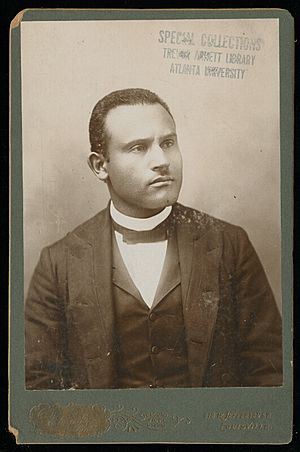Joseph Seamon Cotter Sr. facts for kids
Quick facts for kids
Joseph Seamon Cotter Sr.
|
|
|---|---|

Cabinet card of Joseph Seamon Cotter Sr.
|
|
| Born | February 2, 1861 |
| Died | March 14, 1949 |
| Occupation | writer, poet |
Joseph Seamon Cotter Sr. (born February 2, 1861 – died March 14, 1949) was an important American writer, poet, and community leader. He was born in Nelson County, Kentucky and grew up in Louisville, Kentucky.
Cotter was one of the first African-American playwrights to have his work published. People knew him as "Kentucky's first Black poet with true creative talent." He was born during the American Civil War and grew up in poverty. He didn't get much formal schooling until he was 22 years old. Later, he became a dedicated teacher and worked hard to improve education for Black students.
Contents
Cotter's Family Life
Joseph Cotter came from a family with a mixed background. His father, Michael J. Cotter, was a white man with Scots-Irish roots. His mother, Martha Vaughn, was a free Black woman. She also had a mixed heritage, as her mother was an African slave and her father was English and Cherokee.
On July 22, 1891, Joseph Cotter married Maria F. Cox. She was also a teacher. They had four children together: Leonidas, Florence, Olivia, and Joseph Seamon Cotter Jr.. Joseph Seamon Cotter Jr. also became a well-known poet and playwright.
His Journey in Education
Joseph Cotter left school after finishing third grade to help his family earn money. He worked many different manual jobs until he was 22. At that age, he joined the first night school created for Black students in Louisville.
Cotter attended night school for ten months. During this time, he earned his high school diploma and also got his teaching license. Even though he didn't go to college, his love for reading and writing came from his mother, who read to him often as a child.
A Career Dedicated to Teaching
After becoming a qualified teacher, Cotter got his first job in Cloverport, Kentucky. The schools there were very basic. He taught children in a small one-room school with a dirt floor and no heat. This showed his strong dedication to educating Black children and helping his community.
After two years in Cloverport, Cotter taught at a private school nearby. Two years later, he moved to the Louisville Public School system. His first job in Louisville was at Western Colored School, located in a Black neighborhood. He taught there for four years, from 1889 to 1893.
In 1893, Cotter founded the Paul Laurence Dunbar School. He named it after his friend, the famous poet Paul Laurence Dunbar. Cotter was the principal of this Black high school until 1911. Then, he became principal at Samuel Coleridge-Taylor School, where he stayed until 1942.
Besides his 53-year career as a teacher, Cotter worked to help Black people advance in society. He was part of many local and national groups. These included the Louisville Colored Orphans Home Society, the Kentucky Educational Association, and the NAACP.
Joseph Cotter's Writings
Joseph Cotter wrote and published nine books. Four of these were collections of his poems:
- A Rhyming (1895)
- Links of Friendship (1898)
- A White Song and a Black One (1909)
- Collected Poems (1938)
He also published other works, including:
- Sequel to "The Pied Piper of Hamelin," and Other Poems (1939), which had both poems and stories.
- Negroes and Others at Work and Play (1947).
- Caleb, the Degenerate; A Play in Four Acts: A Study of the Types, Customs, and Needs of the American Negro (1903), a play.
- Two collections of prose (written works that are not poetry): Negro Tales (1912) and Twenty-fifth Anniversary of the Founding of Colored Parkland or "Little Africa," Louisville, Ky., 1891–1916 (1934).
Cotter also wrote for many magazines and newspapers. These included the Louisville Courier-Journal and Voice of the Negro.
His writing often used both dialect (a way of speaking specific to a region or group) and standard English. He used his writing to encourage Black people to improve their lives. He believed this could happen through humility, hard work, education, and a positive attitude.
 | Kyle Baker |
 | Joseph Yoakum |
 | Laura Wheeler Waring |
 | Henry Ossawa Tanner |

